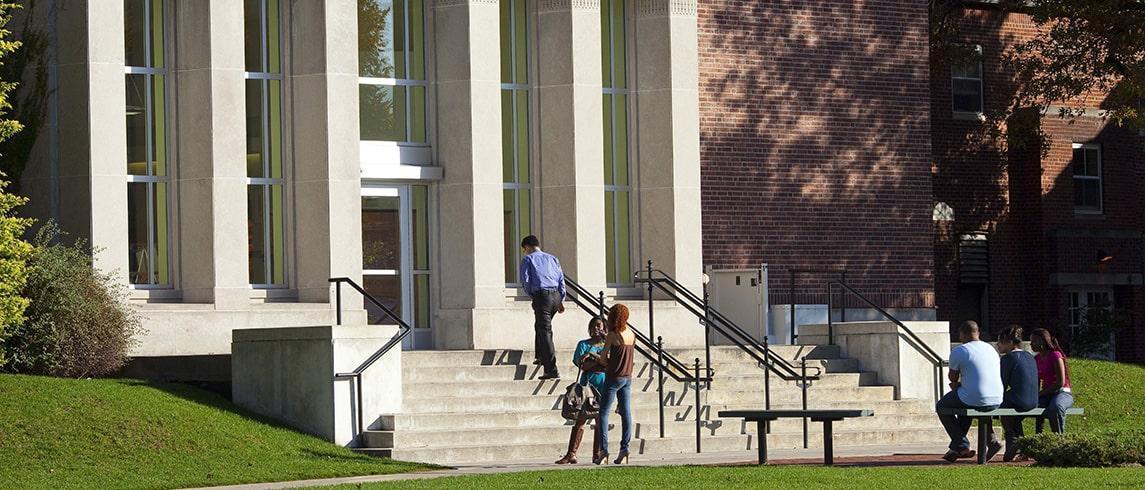Referral Guidelines
Referral Guidelines for Faculty and Staff
A referral for psychological counseling should be considered when you believe a student’s problems go beyond your own experience and expertise, or when you feel uncomfortable helping a student with some issue. A referral may be made either because of the way the student’s problems are interfering with his or her academic work or with your teaching, or because observation of the student’s personal behavior raises concerns apart from his or her academic work.
Some more easily recognizable indicators that a student may be experiencing more stress than he or she can handle include:
- Marked decline in quality of course work, class participation, quality of papers or test results;
- Increased absence from class or failure to turn in work.
- Prolonged depression, suggested by a sad expression, apathy, weight loss, sleeping difficulty, tearfulness.
- Nervousness, agitation, excessive worry, irritability, aggressiveness, non-stop talking.
- Bizarre, strange behavior or speech.
- Extreme dependency on faculty or staff, including spending much of his or her time visiting during office hours or other times.
- Marked change in personal hygiene.
- Talk of suicide, either directly or indirectly such as, “I won’t be around to take that exam anyway” or “I’m not worried about getting a job, I won’t need one.”
Each student experiences stress somewhat differently and many disturbances in the young adult age group are relatively transient. However, you may become alarmed by even brief changes which are extreme, as well as by significant changes that continue for some time. If there is doubt about the seriousness of the problem, consult a counselor in the Wellness Center/Personal Counseling Office about how to evaluate the situation and take the most appropriate steps.
Making the Referral:
One way of introducing the topic of a psychological referral to a student is to summarize to him or her the behaviors that you have observed that concern or worry you. Emphasize the emotional responses that you have heard from him or her, perhaps with an expression of your concern. For example, “You sound very depressed about your relationship problems. I have found that other students who felt that way have been helped by talking to a counselor. How would you feel about that?”
In speaking to the student about counseling, it is important to keep in mind some of the negative reactions a student may have to the idea and be ready to discuss them. You can explain to the student that counseling does not mean s/he is “crazy”, but is dealing with everyday “problems in living. Counseling does provide a chance to explore feelings and solve problems with the help of a sensitive, objective and concerned listener.
Once the student has agreed that counseling might be useful, there are several possible steps to take depending on the student’s attitude and the urgency of the situation. If it is a mental health emergency, please refer to the Mental Health Emergencies page.
1. Give the student information about the Personal Counseling Office and encourage him or her to email.
Although probably ambivalent, it is important that the student want help. Coercing a student to go to counseling is not likely to have positive results in the long run. Generally, unless there is some immediate concern about the welfare of the student or others, it is better to maintain your relationship with the student rather than to try to force him or her to go for counseling. The idea can be brought up again later.
After the Referral is Made:
There are 2 ways to find out whether a student pursued a counseling referral. The first, and more preferred way, is to simply meet with the student and ask. Just as it is reassuring for students to know that you cared enough about them to recognize that they were having a problem, it is even more reassuring for them if you take the time to follow-up with them. This indicates your continued interest. You will find that most students will respond very openly and positively to your inquiry, while others may indicate some embarrassment. No matter how they respond, they will know that you are interested and care.
The 2nd way is to ask the student to sign a release form at the Personal Counseling Office, giving his/her counselor permission to confirm the student’s attendance in counseling. If a student chooses not to give us written permission, however, we cannot contact you. In order to maintain the student’s trust in the confidentiality of the counseling relationship, we do not report to anyone whether or not a student has come for counseling without the student’s written permission to do so.
Working with Students Yourself:
In some cases, students who seek your help or arouse your concern may work more effectively with you rather than being referred to counseling. Your willingness to listen may be very important to those students. You may also choose to work with the student on improving his or her academic work without focusing on the psychological issues that underlie the behavior. A Wellness Center Personal Counselor can be consulted on how best to handle either of these approaches or how and when to make a referral.
The Personal Counseling Staff

|
LeTishia Little
Director-Pers.Counseling Talbott Hall
|
LeTishia holds a BA of Psychology, MA of Counseling and a MA of Christian Counseling. She is licensed by the State of New Jersey as a Licensed Professional Counselor and a certification of Director of School Counseling Services. She is a result oriented Counselor and an Adjunct Professor at Essex County College and Union County College teaching Psychology 101 and Child Development. Her extensive training in various therapeutic modalities such as Cognitive Behavioral Therapy and Trauma Focused Cognitive Behavioral Therapy. Her extensive experience in counseling was received through working in a wide range of settings including hospitals, community-based mental health facilities, and schools. She is an effective facilitator, communicator, and advocate for youth and college students in one-on-one and group settings.

|
Marisa Bonamassa-Cimino
Personal Counselor Talbott Hall
|
Marisa holds a BA in Psychology, an MA in Clinical Mental Health Counseling, and is licensed in the state of New Jersey as a Licensed Associate Counselor. Her clinical specialties include Cognitive Behavioral Therapy, Brief Solution Focused Therapy, and Trauma-Informed Counseling. Her clinical experience includes working with persons of color, individuals apart of the LGBTQIA+ community, and victims of sexual violence. Marisa promotes a safe, confidential space for all students, and considers herself an ally of the Black Lives Matter Movement, and the LGBTQIA+ community. Marisa is also an effective group facilitator, teacher, and mentor to college students. In her leisure time, Marisa advocates for social justice, and enjoys hiking, reading, art, music, traveling, and spending time with loved ones.
Psychological Emergencies
Depending upon the nature and timing of an emergency, your options are:
During counselors’ office hours, call Ext. 1403. Office hours are Monday-Friday from 8:30 a.m.-4:30 p.m. Summer Hours are Monday-Thursday 8:30am - 5:00pm
If it is after hours/no answer in the Personal Counseling office, contact BC Security by dialing “0” on an interoffice line or Toll Free at 800-809-2222 and Security will decide how best to help the student
At any time, call 973-844-4357. This is the 24-hour crisis line for Clara Maass Medical Center. In case of psychiatric emergencies (i.e., someone is an imminent danger to self or others) they will send someone to complete an assessment.

